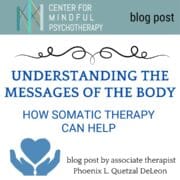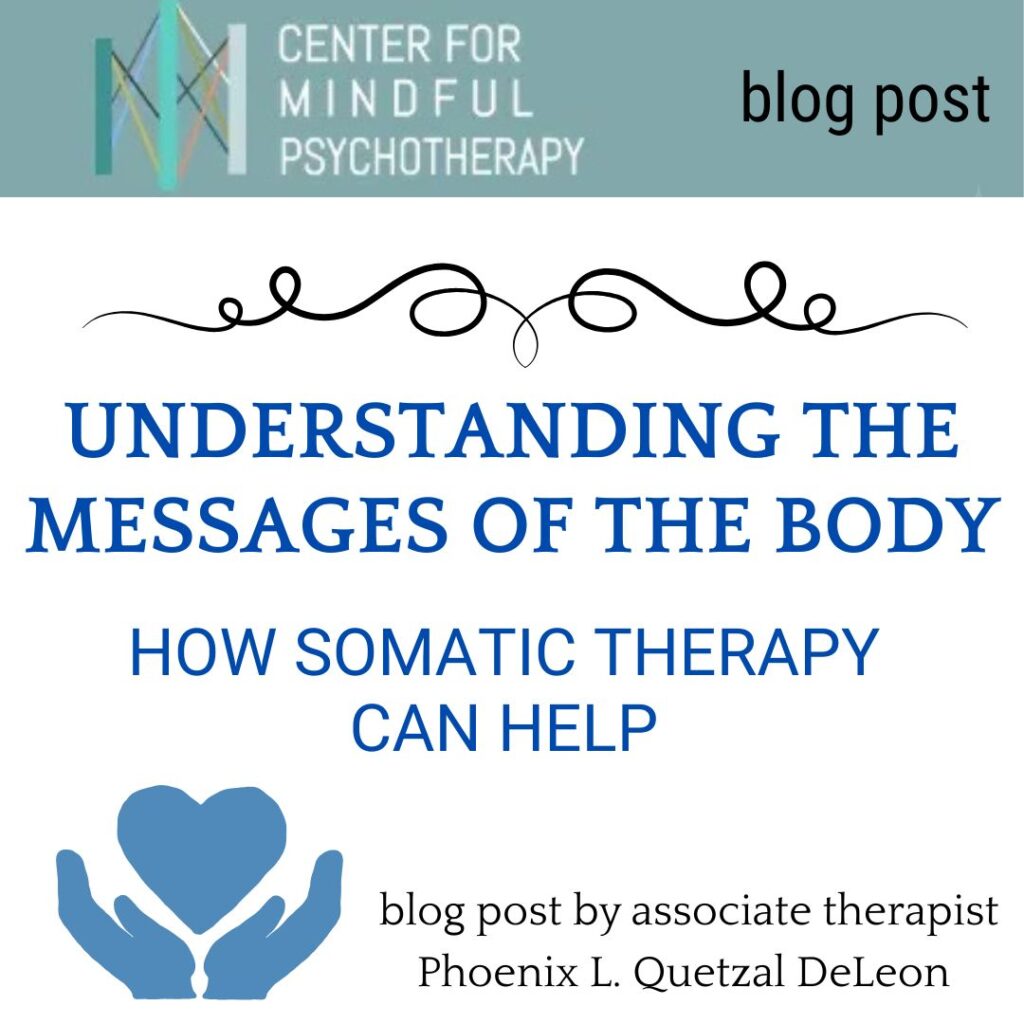
This is a guest post explaining what somatic therapy really is offered by our associate therapist Phoenix L. Quetzal DeLeon. Phoenix brings more than 25 years of experience in teaching and bodywork into their therapy practice, where they specialize in supporting people working through anxiety, trauma, and body image concerns.

If you’ve ever wondered what somatic therapy is, and how it can help you, this post is here to offer a quick grounding in the basics of this type of therapy. As a somatic therapist, I think it’s important to understand the differences between somatic therapy and talk therapy, and how somatic therapy can be beneficial.
First, what is somatic therapy?
It’s helpful to know that the word “somatic” is derived from the Greek word “soma,” which refers specifically to the body. In this way, somatic therapy could be described as “therapy of the body.” But it would be more accurate to say that it’s the therapy of the body and mind – especially if we consider that the body and mind are not separate from one another. From this perspective, working with the body is an important aspect of working with the mind. Another way to frame it is that somatic therapy addresses the whole person, the body and mind together.
The biggest difference between talk therapy and somatic therapy is the focus on body responses in addition to thoughts and emotions. Skilled somatic therapists support their clients in noticing, observing and learning to track these messages from our bodies. When clients have access to this kind of somatic practice in therapy, it helps them to recognize when and how their embodied responses might positively or negatively affect them. It also shows clients how to connect with their bodies in support of tending to their mental health.
As an example, I can share one of my own experiences with this.
I was working with a somatic therapist on a struggle I was having with anxiety. Each time I talked about this experience, my body would tense, my hands would clench, and I would feel a fluttering in my stomach and chest – it would start to feel a little overwhelming. The therapist gently asked me to pause, and “rewind” a little bit to the moment just before I started talking about the anxiety I was feeling. She helped me to pinpoint the moment these body messages started showing up, and asked what it might be like to slow down and check in with my body before I started feeling anxious.
As I played with this sense of awareness, I realized that my body was anticipating the experience of anxiety, and would clench in response. When I was able to slow down, I noticed that I could track the messages from my body and start resourcing myself differently. Meaning, I could take a breath, allowing myself to relax a bit. Or I could practice clenching and releasing my hands to ease some of the tension. While simple, these somatic practices had the effect of creating a little more space in my body, which made it easier for me to process the anxiety I had experienced without feeling overwhelmed. I become more confident in being able to address my anxiety from a place of embodied awareness, and at a pace that worked for me.
Connecting with the messages of the body, or developing somatic awareness, is one of the great benefits of somatic therapy.
As we become more familiar with our embodied responses, we can ally with our bodies and have more choices about working with our emotions and behaviors. One of the most common reasons people seek therapy is to get help for emotional states that are overwhelming and/or disruptive to their lives. These emotional states can show up in many different ways, including behaviors that we may struggle with, and this is reflected in our bodies. When we cultivate body awareness through somatic therapy, it helps us to listen to the signals our bodies give us in different situations. Learning to recognize these body messages can give us a deeper understanding of difficult emotional states and behaviors, which in turn can give us more agency, and empower us to make informed choices about how to address them.
Phoenix L. Quetzal DeLeón AMFT #129332
Voicemail: (408) 706-2770
Website: https://www.therapywithphoenix.com/
Mindful Center for Psychotherapy Bio
Email: [email protected]


